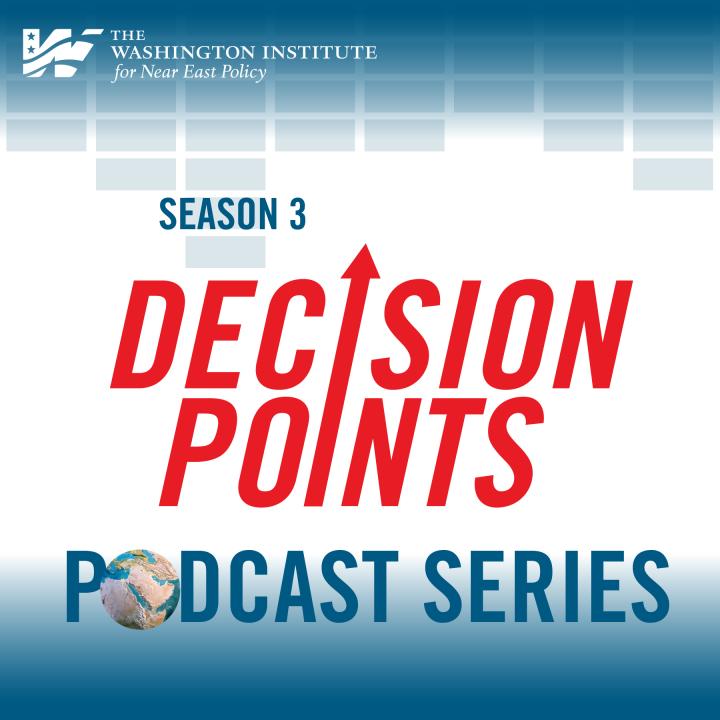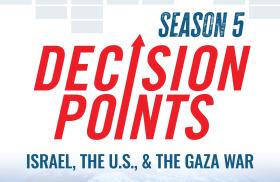
- Policy Analysis
- Podcast & Video
Decision Points Podcast: Season 3 Israel’s Challenging Policy Dilemmas

Part of a series: Decision Points Podcast
or see Part 1: Decision Points Podcast: Season 1 The U.S.-Israel Relationship
This season of the Decision Points podcast with host David Makovsky focuses on challenging Israeli policy dilemmas.
This season of Decision Points features episodes on Israel's toughest contemporary policy dilemmas requiring courageous leadership and creative thinking. Topics range from the aftermath of the Gaza conflict to the Israeli-Russian relationship. Each episode will explore a thorny policy issue as well as its context, trajectory, and Israel's options. The first episode premieres on June 15th and focuses on the the Iranian nuclear program.
Episode 1: The United States, Israel, and the Iranian Nuclear Program
World attention has focused on the prospects of the United States and Iran finding terms that enable them to return to their 2015 nuclear deal. Yet what does this mean for all the unanswered challenges that President Biden and Secretary of State Blinken say are essential to address in a “longer and stronger” follow-on agreement? How will the United States preserve its leverage for such a second round? What incentives will Iran have to engage in negotiations after a Vienna deal is reached? And what does this mean for Israel and the rest of the Middle East?
For the first episode of the season, host David Makovsky discusses this major decision point with three guests who have deep expertise on Iran, the nuclear program, and Israel’s approach to deterring it.
Ambassador Dennis Ross, the William Davidson Distinguished Fellow at the Washington Institute for Near East Policy, formerly served as special assistant to President Obama and senior director for the Central Region at the National Security Council, among other prominent positions.
Ray Takeyh is the Hasib J. Sabbagh senior fellow for Middle East studies at the Council on Foreign Relations and author of the recent book The Last Shah: America, Iran, and the Fall of the Pahlavi Dynasty.
Ariel (Eli) Levite is a nonresident senior fellow in the Nuclear Policy Program and Cyber Policy Initiative at the Carnegie Endowment; previously, he served as principal deputy director-general for policy at the Israeli Atomic Energy Commission from 2002 to 2007.
Episode 2: Israel's Powder Keg: Hamas in Gaza
In May, after tensions escalated in Jerusalem, Hamas and Israel broke a two-year ceasefire and were drawn into war. The crisis reminded the world that the ideological differences between the sides are vast. Are Israel and Hamas doomed to face each other every few years? How much of a game-changer was this round of fighting for them, the UN, and key regional players? What are some of the difficult options ahead?
In this episode, David Makovsky hosts three expert guests on Israeli-Palestinian affairs.
Nickolay Mladenov served as the UN secretary-general’s special coordinator for the Middle East peace process between 2015 and 2020 as well as Bulgaria’s minister of defense and foreign affairs.
Michael Herzog, a retired brigadier general in the Israel Defense Forces, is the Milton Fine International Fellow with The Washington Institute. Over the past decade, he has held senior positions in the office of the minister of defense under Ehud Barak, Amir Peretz, Shaul Mofaz, and Binyamin Ben-Eliezer.
Karim Haggag, a career Egyptian diplomat with over twenty-five years of service, currently works as a professor of practice in the School of Global Affairs and Public Policy at the American University in Cairo.
Episode 3: Israel's Gray Zone: Iran in Syria
Since 2015, Iranian forces have increasingly entrenched themselves in Syria as part of a broader effort to bolster the rule of Bashar al-Assad. As this effort began to unfold, Israel feared reenacting the cautionary tale of Hezbollah in Lebanon, where indecision over rooting out the Tehran-backed terrorist group proved to be a decision in itself. To avoid a situation in which Iranian or proxy forces are positioned along the entirety of Israel’s northern border, the IDF has been walking a tightrope in Syria, taking direct action against major security threats while trying to avoid a full-scale war. Can this gray zone strategy succeed in pushing Iran out of Syria or not?
To discuss this regional decision point, David Makovsky hosts distinguished guests James Jeffrey, Assaf Orion, and Oula Alrifai.
Ambassador Jeffrey served as the U.S. special representative for Syria engagement and special envoy to the Global Coalition to Defeat ISIS until November 2020. He currently chairs the Wilson Center’s Middle East Program.
General Orion is a senior fellow at Tel Aviv’s Institute for National Security Studies and the Rueven International Fellow with The Washington Institute. Previously, he served as head of the Strategic Division in the IDF General Staff’s Planning Directorate.
Alrifai, a native of Syria, is a fellow in The Washington Institute’s Program on Arab Politics, author of its recent study In the Service of Ideology: Iran’s Religious and Socioeconomic Activities in Syria, and executive producer of the award-winning documentary Tomorrow’s Children.
Episode 4: Putin, Israel, and the Calculated Limits of a Bilateral Relationship
For decades, Israel and Russia stood on opposite ends of an ideological divide. During the Soviet era, Moscow not only supported Israel’s enemies economically and militarily, but also sought to stamp out any connection between Russian citizens and Israel, refusing millions the right to emigrate. Since the Soviet collapse in 1991, however, relations have turned a corner.
Where are Russian-Israeli ties headed today? What are Vladimir Putin’s motivations for involvement in the Middle East, and what implications does this activity hold for Israel? Host David Makovsky discusses these and other issues with Anna Borshchevskaya and Daniel Rakov.
Anna Borshchevskaya is a senior fellow at The Washington Institute, focusing on Russia’s policy toward the Middle East. In addition, she is a contributor to Oxford Analytica and a fellow at the European Foundation for Democracy.
Lt. Col. Daniel Rakov, Israel Defense Forces (Ret.), is a research fellow at the Institute for National Security Studies in Tel Aviv, focusing on Russian policy and great power competition in the Middle East.
Audio clips from Euronews “Netanyahu meets Putin in Moscow”
Episode 5: Hezbollah and Israel: Between Deterrence and Deterioration
Since the 2006 Lebanon war, Israel and Hezbollah have not engaged in major hostilities. Yet while mutual deterrence has averted all-out war, this uneasy truce is weakening. At home in Lebanon, Hezbollah is facing a dire economic and political crisis. Moreover, the group still seeks to convert some of its estimated 140,000 rockets into precision-guided missiles, a serious threat to Israel. It has also fired antiaircraft weapons at Israel from Syria in support of Iran’s presence there.
Is deterrence unraveling, and is a full-blown conflagration inevitable? To discuss this major decision point, David Makovsky hosts a new episode with Hanin Ghaddar, David Schenker, and Amos Gilead.
Hanin Ghaddar is the Friedmann Fellow in The Washington Institute’s Geduld Program on Arab Politics, where she focuses on Shia politics throughout the Levant. Previously, she worked as the longtime managing editor of the NOW Lebanon news site, where she shed light on Hezbollah’s political evolution and Iran’s growing regional influence.
David Schenker is the Institute’s Taube Senior Fellow. Previously, he served as assistant secretary of state for Near Eastern affairs through January 2021.
Gen. Amos Gilead dedicated most of his career in the Israel Defense Forces to the Military Intelligence Corps. As chief of the Intelligence Research and Analysis Division, he was responsible for producing the national intelligence assessment and other strategic analysis. Currently, he teaches security and intelligence studies at IDC Herzliya’s Lauder School of Government, Diplomacy, and Strategy.
Audio clips from C-SPAN “Israeli Prime Minister Remarks at U.N. General Assembly”
Episode 6: Israel’s Dramatic Energy Turnaround
After decades of energy dependence, Israel discovered offshore natural gas reserves that have fundamentally changed its energy dynamics and led it to deepen ties across the Mediterranean and the Middle East. The country is suddenly a net energy exporter to Jordan, Egypt, and the Palestinians, while Gulf states have shown preliminary indications that they would like to develop such ties as well. Yet these reserves are also a source of tension with regional neighbors Turkey and Lebanon. What are the possibilities and limits of Israeli natural gas, and what is the country’s energy trajectory in the Middle East?
Host David Makovsky discusses this major decision point with Amit Mor and Ephraim Sneh.
Amit Mor is the CEO of Eco Energy Ltd. Over the past eighteen years, he has served as a consultant to governments, financial organizations, and companies in Israel and abroad in the fields of petroleum, natural gas, power, infrastructure, and the environment.
Ephraim Sneh, a retired Israeli general, served in several cabinets as deputy defense minister and other roles. He currently chairs the S. Daniel Abraham Center for Strategic Dialogue at Netanya Academic College.
Audio clip from "PM Netanyahu's Statement at the Trilateral Meeting between Israel, Greece and Cyprus"
Episode 7: China's Middle East Gambit
Over the past two decades, China has increasingly challenged America’s economic and political influence in the Middle East, including in Israel. At the same time, Washington remains Jerusalem’s strongest ally and patron, which raises questions about how the U.S. relationship affects Israel’s policies toward Beijing. On one hand, Chinese investment is enticing—large-scale infrastructure projects at low cost. On the other hand, Israel needs to be mindful of Chinese influence given Beijing’s competition with the United States and growing ties with Iran.
In this episode, Assaf Orion and Michael Singh join host David Makovsky to discuss where Israel draws the line with China, and what implications this line holds for relations with Washington.
Brig. Gen. Assaf Orion, IDF (Ret.), is a defense strategist whose broad research ranges from China’s foreign relations to Israel’s regional political-military strategy. He is currently the Rueven International Fellow with The Washington Institute.
Michael Singh is the Institute’s Lane-Swig Senior Fellow and managing director. Previously, he served as senior director for Middle East affairs at the National Security Council.
Audio clips from i24News “The Growing Israel-China Economic Partnership”
Episode 8: One State or Two States? Trends in Israeli and Palestinian Public Opinion
In recent years, public support for the two-state solution has continued to erode on both sides of the Israeli-Palestinian divide. Each party suspects that the other has completely given up on the idea, further weakening the political will and public trust needed to preserve it. Can leaders lead the public on this issue, or does the public lead them? Will Israel’s new government attempt to narrow these points of difference, and are the Palestinians still open to such gradualism?
In this episode, David Makovsky hosts Khalil Shikaki, David Pollock, and Tamar Hermann for a discussion on what polling can tell us about these issues. Where does current Israeli and Palestinian public opinion fall on the two-state question, and what deeper insights does the data hold?
Khalil Shikaki is the director of the Palestinian Center for Policy and Survey Research in Ramallah and a senior fellow with the Crown Center for Middle East Studies at Brandeis University.
David Pollock is the Bernstein Fellow at The Washington Institute and director of Project Fikra. Previously, he served as senior advisor for the broader Middle East at the U.S. State Department.
Tamar Hermann is a senior research fellow at the Israel Democracy Institute and academic director of the Viterbi Family Center for Public Opinion and Policy Research.
Audio clips from AP “Peace Agreement Signing In Washington (A)” i24News “20 Years Since the Outbreak of the Second Intifada”
Episode 9: The Abraham Accords One Year Later: Can They Change the Middle East?
August 13 marked the first anniversary of the breakthrough normalization agreement between Israel and the United Arab Emirates—a deal followed shortly by accords with Bahrain, Sudan, and Morocco. In addition to strong U.S. mediation, several broader forces brought these countries together, including mutual concerns about Iran, Arab recognition of how Israeli technology could help their societies, and a desire to bolster the stability of pro-Western governments amid questions about America’s long-term commitment to the Middle East.
Now that some Arab leaders see Israel as part of a solution to their challenges and are unencumbered by the enmity of the past, what will it take to deepen these relationships and extend them to other states? How does the Palestinian issue play into this effort? And what can Washington do to strengthen the Abraham Accords?
To discuss these questions, David Makovsky hosts renowned experts Ebtesam al-Ketbi, Amos Yadlin, and Thomas Friedman.
Ebtesam al-Ketbi is founder and president of the Emirates Policy Center and the first Arab woman to lead a think tank. Additionally, she is a professor of political science at United Arab Emirates University and a member of the Gulf Cooperation Council’s Consultative Commission.
Amos Yadlin was executive director of the Institute for National Security Studies at Tel Aviv University from November 2011 to May 2021. He also served in the Israel Defense Forces for forty years, including posts with the General Staff and as chief of military intelligence.
Thomas Friedman is an internationally renowned author, reporter, and columnist. He has written seven New York Times bestsellers and received three Pulitzer Prizes—two for reporting from the Middle East and a third for his columns about 9/11.
Episode 10: Can the Bennett-Lapid Government Last, and Who Comes After Abbas?
Prime Minister Naftali Bennett’s visit to the White House this week is a timely reminder of potentially new political dynamics in Israel and the Palestinian Authority. Israeli has just exited the whirlwind of four elections in two years, replacing long-serving Likud leader Binyamin Netanyahu with an extraordinarily diverse coalition. Meanwhile, the PA has postponed its first planned election since 2006 and is still led by President Mahmoud Abbas, who is reportedly eighty-six years old.
For Israel, the question is whether the new government can survive the formidable challenges looming at home and abroad. For the Palestinians, many are wondering who will succeed Abbas and what will happen the day after he leaves the scene. To answer these questions, David Makovsky closes season 3 of Decision Points with political experts Ben Caspit, Tal Schneider, Ghaith al-Omari, and Ibrahim Dalalsha.
Ben Caspit is a senior columnist for the Israeli daily Maariv. He has worked as both a print commentator and radio/television anchor during his distinguished three-decade career, focusing on politics, diplomacy, military affairs, and the peace process.
Tal Schneider is a political correspondent for The Times of Israel and a former Washington correspondent for Maariv. In 2012, she won the Tel Aviv Journalists Association Award for Excellence in Digital Journalism.
Ghaith al-Omari is a senior fellow at The Washington Institute and former executive director of the American Task Force on Palestine. He also served as an advisor to the negotiating team during the 1999-2001 permanent-status talks and held various positions within the Palestinian Authority.
Ibrahim Dalalsha directs the Horizon Center for Political Studies and Media Outreach, a think tank based in Ramallah. Previously, he served as senior political advisor at the U.S. consulate-general in Jerusalem for two decades.






